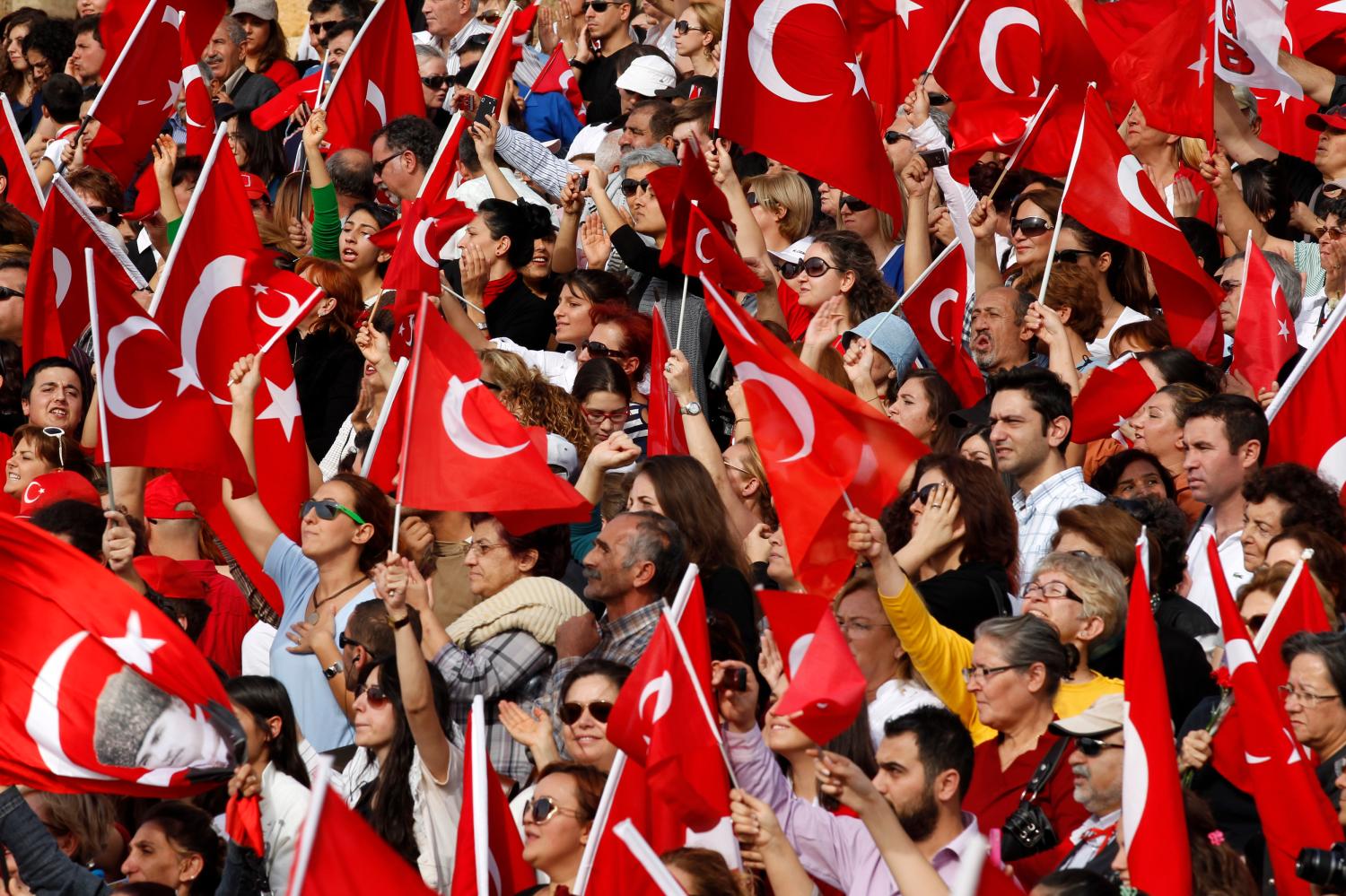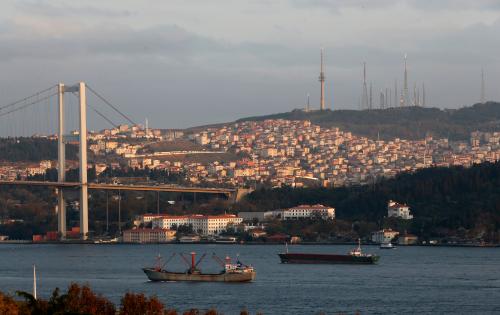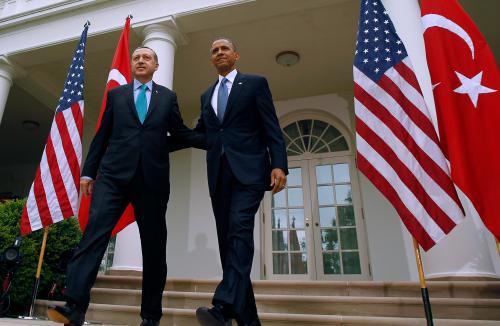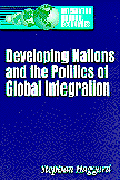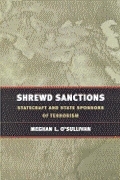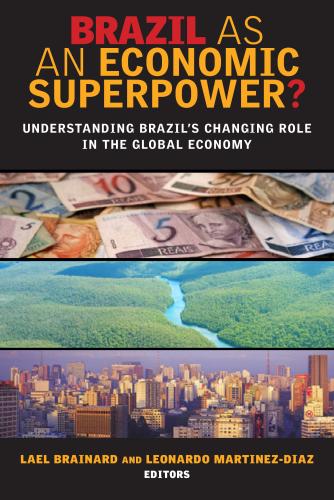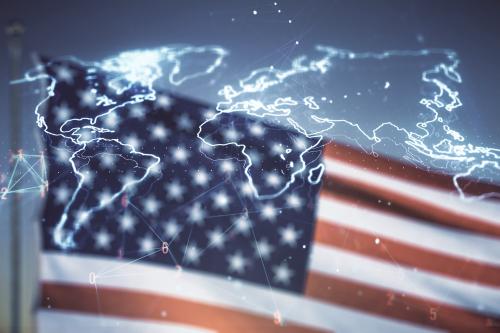During his second term, President Obama has the opportunity to re-invest in the U.S.-Turkish relationship, focusing on a long-time U.S. ally. Kemal Kirişci wrote this memorandum to President Obama as part of
Big Bets and Black Swans: A Presidential Briefing Book
.
-
- Why is Turkey an important cornerstone in establishing the liberal global order?
-
- Can Turkey set an example and help spread democratic values to neighboring countries?
-
- How can the Transatlantic Free Trade Agreement (TAFTA) boost the U.S.-Turkish relationship?
Download Memorandum
(pdf) |
Download the Presidential Briefing Book
(pdf)
TO: President Obama
FROM: Kemal Kirişci
Turkey is a country that has been a long time ally of the United States with a major stake in the liberal world order. During your first term, you rightly recognized the nation as a Big Bet—paying your first official visit in Europe to Turkey and becoming only the second U.S. president, after Bill Clinton, to address the Turkish Parliament. Turkey was offered a model partnership with the U.S., and great hopes were invested in the relationship. However, reality evolved somewhat differently and a number of Black Swans intervened. The 2010 Turkish vote at the United Nations Security Council against sanctions on Iran accompanied with deteriorating relations with Israel as well as the EU and persistent anti-Americanism among the Turkish public have all led to fears that Turkey is “shifting axis” and being “lost”. Yet, this is only part of the picture.
Your Big Bet on Turkey fostered the development of a close rapport with Turkish Prime Minister Tayyip Erdogan, and you made the most of this connection by frequently consulting with one another on world and regional affairs. Turkey cooperated closely with the U.S. on Afghanistan as well as in Iraq. Both countries adopted similar approaches towards the Arab Spring even if Erdogan expressed some virulent frustration with the U.S. for not supporting the opposition against the Assad regime in Syria more forcefully and decisively. There were also modest but important gains made in bi-lateral trade that had constantly been falling in relative terms since the end of the Cold War. This was coupled with field oriented pragmatic cooperation to assist reform in the Arab and Muslim world.
Recommendation:
Clearly, much more could have been achieved and highlighting a more ambitious agenda for U.S.-Turkish relations for your administration is critical. Turkey itself is still a Big Bet if the global liberal order in Turkey’s neighborhood and Turkey’s own membership to that order is going to be ensured. That would also help keep the multitude of Black Swans from getting in the way of realizing the grander Big Bets or for that matter Turkey itself becoming a Black Swan.
The time to double-down on Turkey is especially ripe, and a delay could be costly. As Turkish President Abdullah Gul reaffirmed in the January-February issue of Foreign Affairs, “from a values point of view we are with the West”. This opportunity coincides with a time when there are increasing signals from Turkey to reinvest into its relations with the West.
Background:
It is often forgotten that Turkey was a participant in the making of the global liberal order at the end of the Second World War, albeit of course a very junior one. Yet, it was this experience that set Turkey on the unusually long path of becoming a multi-party democracy with a liberal market economy. Indeed Turkey’s transformation was a slow and painfully one with lots of ups and downs. All U.S. administrations from Harry Truman onwards played a role in this process but the most critical one was probably the Clinton administrations. They played a particularly central role in nudging Turkish democracy and economy a little closer to European standards and helped Turkey first to sign a customs union with the EU in 1995 and then eventually become a candidate country for EU membership in 1999 followed by the beginning of accession negotiations. These policies were Big Bets that handsomely paid off. Both President George W. Bush in 2004 like his successor in 2009 recognized Turkey’s economic and democratic success and hoped that Turkey could set an example for its neighborhood, particularly for the Arab and Muslim worlds.
Actually, some of their hopes can be said to be materializing. Turkey has both economically and politically become deeply integrated with its neighborhood. Turkey’s Gross Domestic Product in 2011 was greater than all of its surrounding eleven neighbors economies put together excluding Iran and Russia. This economy is increasingly becoming an engine of growth for these neighboring countries even if modestly. Turkey’s trade with these countries increased from 10 percent of Turkey’s overall foreign trade in 1991 to 22 percent in 2011 while its trade with the EU and the U.S. has dropped from 50 and 9 percent to 41 and 5 percent respectively. An ever growing number of Turkish companies are investing in most of these countries while Turkey is fast becoming an immigration country and a source of remittances for labor migrants of the region. This kind of economic engagement is having a transformative impact and helping to integrate this neighborhood into the global markets. Turkish government and civil society are also modestly involved in projects and programs assisting political transition and reform. However, Turkey’s both economic and democracy gains remain fragile. Turkey runs an important current accounts deficit and needs to raise its savings levels as well as research and development budgets. The Arab Spring has adversely affected its trade and economic relations with the Middle East. There are also growing concerns about an erosion of the democratic gains achieved in the recent past particularly with respect to freedom of expression and rule of law. The Kurdish question still constitutes a major challenge to long term domestic stability. The constitutional reform process appears to be stuck too.
Conclusion:
At a time when Turkey’s neighborhood is filled with vital challenges, it is of paramount importance that your second administration recognizes the importance of securing Turkey’s commitment to the global liberal order and its potential bearing on the America’s capacity to realize regional foreign policy objectives. There are many ways in which this could be achieved, but the most effective one may well arise from associating Turkey with negotiating a Transatlantic Free Trade Area (TAFTA). This is critical because the free trade agreements that the EU signs with third parties have long been a major source of resentment and grievances for Turkey. This is because the customs union requires that Turkey take on all the obligations associated with such agreements without binding third parties to extend any trade privileges to Turkey. So far the EU has not been very responsive to Turkish calls to rectify this situation.
The U.S. is uniquely positioned to help. Seating Turkey at the negotiating table for TAFTA would be unrealistic. However, the U.S. could convince the EU to at least involve Turkey in a consultation process and ensure that as Turkey opens up its markets to the U.S. Turkish businesses can also enjoy better access to U.S. markets. The logic behind why this would be an effective Big Bet is quite straight forward. The more Turkey can participate in TAFTA, the more its economy would grow. The more it grows, the more it can import U.S. as well as EU goods and services. Furthermore, the more Turkey’s liberal market grows, the greater the demands for the consolidation of democracy and the rule of law in Turkey. In turn, with an economy equaling the 6th largest in the EU and 15th largest in the world, Turkey’s economic force would benefit the neighborhood as well. In this way not only would Turkey be tied to the liberal global order, but it would also become an even more effective conduit for disseminating liberal economic and democratic values to a neighborhood still struggling to transition from the legacy of command economies and authoritarian political systems.
The Brookings Institution is committed to quality, independence, and impact.
We are supported by a diverse array of funders. In line with our values and policies, each Brookings publication represents the sole views of its author(s).

